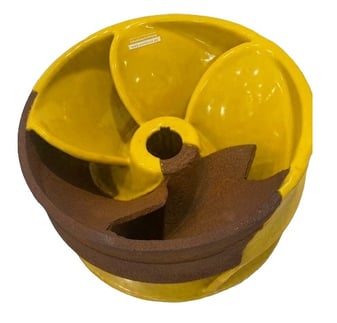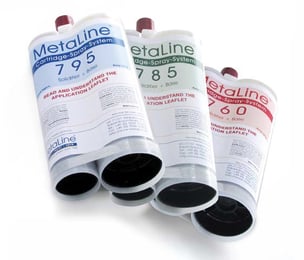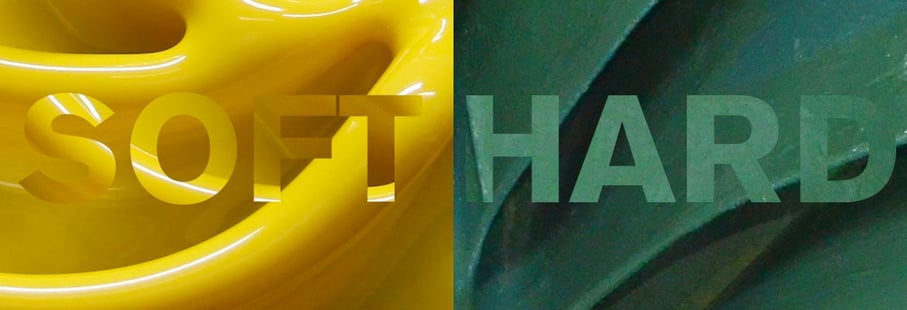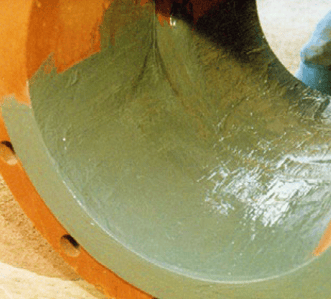Coatings are commonly used in a wide range of applications, ranging from protecting surfaces to enhancing their appearance as they offer a wide range of benefits. There are two main types of coating: soft and hard. While both types of coating offer advantages, there are significant differences between them.
Soft or hard coating: which is the right for the job
What are soft coatings?
Soft coatings are typically made of organic polymers, such as urethane, and have a low surface hardness. They are often used to enhance the performance and durability of surfaces. Soft coatings provide excellent adhesion to substrates, which allows for a strong bond between the coating and the surface. Additionally, they offer superior flexibility, making them ideal for use in applications where the coated surface will undergo frequent flexing, bending, and impact. Soft coatings are also resistant to chemicals, dynamic abrasion, cavitation, and corrosion, making them ideal for use in harsh environments.
Soft coatings are ideal for specific applications, such as pump impellers and mill circuit chutes that are prone to cavitation and dynamic abrasion. These coatings are designed to absorb impact energy instead of deflecting it, making them an excellent choice in those settings.
 What are hard coatings?
What are hard coatings?
Hard coatings, on the other hand, are made of inorganic materials, such as ceramics, and have a high surface hardness. They are often used to protect surfaces from linear wear, scratch, and impact damage. Hard ceramic coatings can offer superior linear abrasion resistance and are ideal for use in applications where the coated surface will undergo significant linear wear but little to no impact. Additionally, hard coatings can provide some corrosion resistance, making them ideal for use in rough environments.
Hard ceramic coatings are ideal for situations where re-shaping of a solid structure is required or where there are substantial linear erosion issues such as in transfer vessels where there is very small turbulence but aggressive slurry transfer.
Difference between soft and hard coatings
The primary difference between soft and hard ceramic coatings lies in their hardness. Soft coatings have a low surface hardness and are flexible, while hard coatings have a high surface hardness and are rigid. The choice between a soft or hard coating depends on the application and the surface being coated. In general, soft coatings are more suitable for applications where flexibility, impact resistance, cavitation resistance, and chemical resistance are critical. In contrast, hard coatings are more suitable for applications where linear wear and abrasion resistance are important.
Soft coatings can also offer some degree of self-healing, meaning that the coating can repair minor damage on its own, without the need for manual intervention. Hard coatings, on the other hand, typically cannot self-heal, but can offer superior scratch and linear wear resistance.
Global Pumps YouTube channel: Is Wear Ruining Your Pump Parts? Here's How We Solve It.
Which MetaLine product is soft or hard coating?
 As we saw, soft and hard coatings are two types of coating that offer different benefits. Soft coatings such as Global Pumps MetaLine 700 series are flexible, chemically resistant, and offer some degree of self-healing, while hard coatings such as Global Pumps MetaLine XL Series are rigid, can provide superior linear abrasion and scratch resistance, and can provide structure for building up worn areas.
As we saw, soft and hard coatings are two types of coating that offer different benefits. Soft coatings such as Global Pumps MetaLine 700 series are flexible, chemically resistant, and offer some degree of self-healing, while hard coatings such as Global Pumps MetaLine XL Series are rigid, can provide superior linear abrasion and scratch resistance, and can provide structure for building up worn areas.
With a wide range of MetaLine products and inhouse coating specialist consultation, Global Surface Protection can help you choose the perfect soft or hard coating for the application and surface of your need.
Get in touch with our product manager Steve, today.



